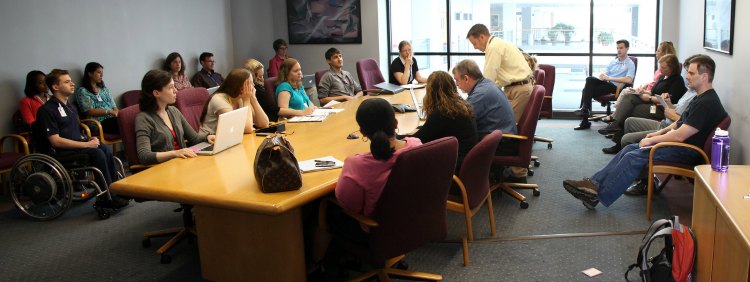Usually when I write or speak about improving meetings, my goal is to help meeting leaders plan and lead a better meeting. I want them to individually make a positive impact through their efforts.
In this article, let’s go big. Suppose that you are charged with changing the meeting culture for the whole organization. How would you go about your work?
Let me suggest that you start with three small steps that each can have a big impact. Think of them as creating a firm foundation for any other work you eventually choose to undertake.
Create Company-Wide Meeting Rules
I always tell meeting leaders they should have some ground rules for the meetings they lead. Instead of counting on leaders to set rules for each meeting, make everyone’s life easier by establishing a common set for all meetings.
While you may think good meeting behaviors are common sense, don’t count on that to serve as a guide for participants. Spell out the ground rules for how people are to behave in meetings.
They can always be tweaked and amended on a meeting by meeting basis, but you can start by creating a basic set of guidelines that can be posted in all meeting spaces.
The rules help keep things on track. They should be:
- Clear
- Behavioral
- Enforceable
- Useful
Here are a few of my favorites:
- Start the meeting on time.
- Say what you need to say in the meeting, not after.
- Stay on topic.
- Let people finish their comments prior to jumping in.
- Invite others into the conversation.
Publish Meeting Leader Guidelines
Just like meeting attendees who may not know what good participation looks like, people who call meetings often don’t understand their basic responsibilities.
Spell out those expectations for anyone who runs meetings. Think of it as saying this to all prospective meeting leaders: “You can call a meeting, but you need to follow these requirements.” Here’s a list to get you started:
- If there isn’t a good reason to meet, there will not be a meeting.
- If there isn’t a good reason for you to attend a meeting, you will decline the invitation.
- Every meeting will set goals to achieve one or more measurable objectives.
- Every meeting will have a reasonable plan for achieving the objectives.
- Every meeting will have one person in charge of leading the discussion.
- All decisions and action items will be recorded by one person who is in charge of taking notes.
- Meetings will not be scheduled to last any longer than a tightly developed plan determines they need to last.
- Meetings will start on time.
- Meetings will not run past the scheduled end time.
- If the meeting agenda is completed before the scheduled end time, the meeting will adjourn.
- Somebody will pay attention to the clock.
- The quality of every meeting will be evaluated at the end, and improvement suggestions will be incorporated into future meetings.
Establish Facilitator Training
Setting expectations isn’t enough. You need meeting leaders to develop skills so that they can live up to those expectations.
Running a great meeting requires skill, discipline, and courage. These can be learned through training and practice. Your organization needs to set a simple goal:
All meetings will be led by a skilled meeting facilitator.
Make it your concern to provide people with the training they need to build skills and confidence.
What Are You Waiting For?
It’s time to go to work. These initiatives will create better meetings. They only need someone to get them off the ground and moving forward. That someone is you.
If you need help, I’m standing by and willing to be of service. I offer a wide range of training and coaching services for aspiring meeting heroes.

